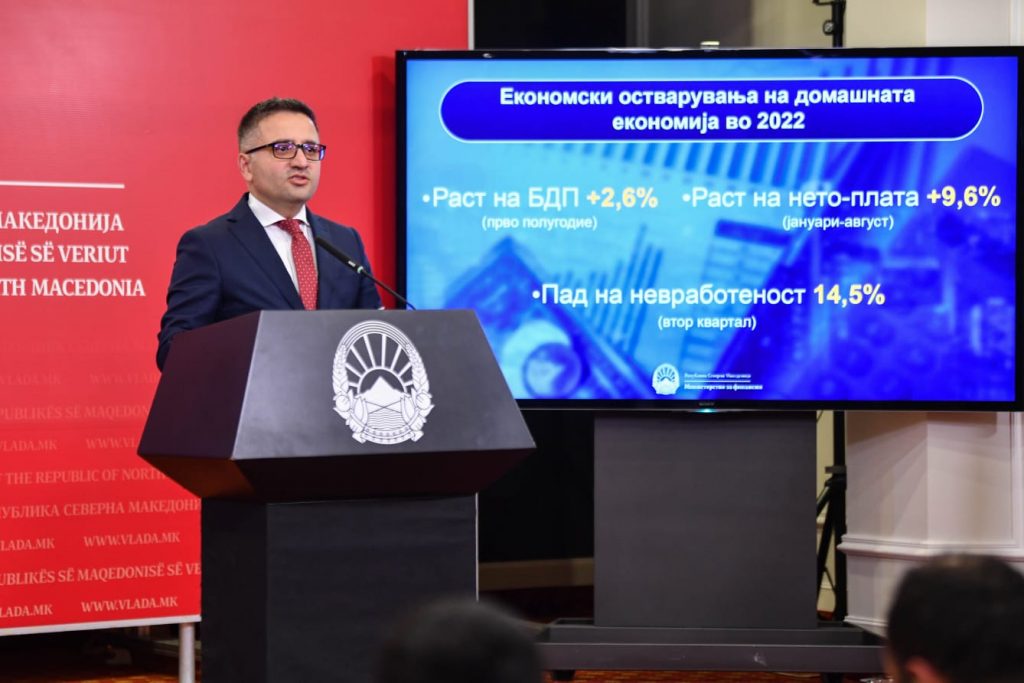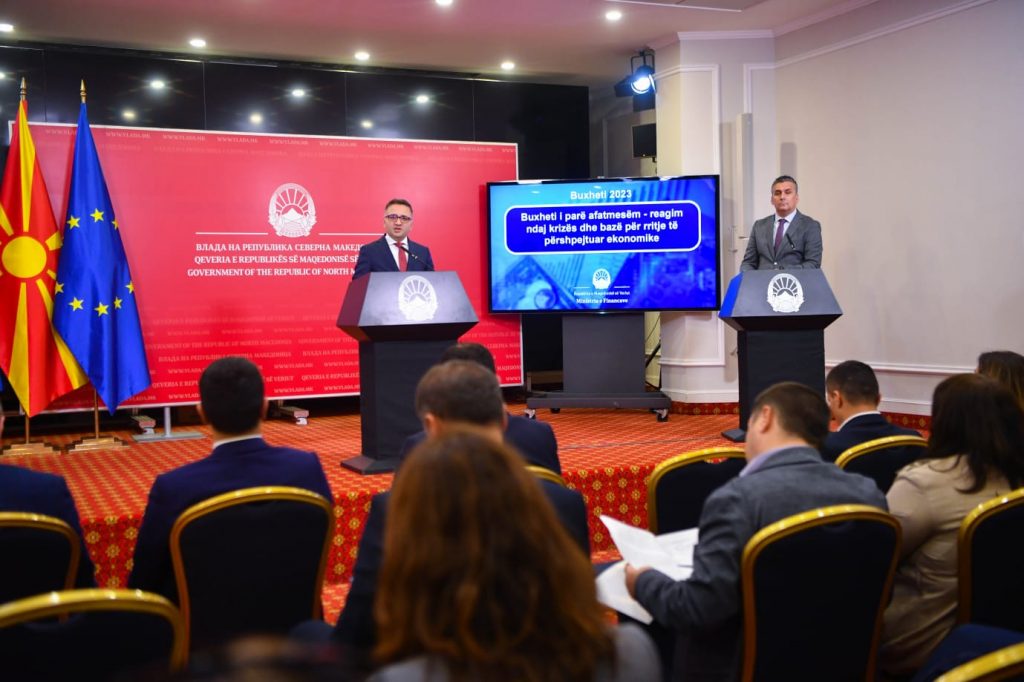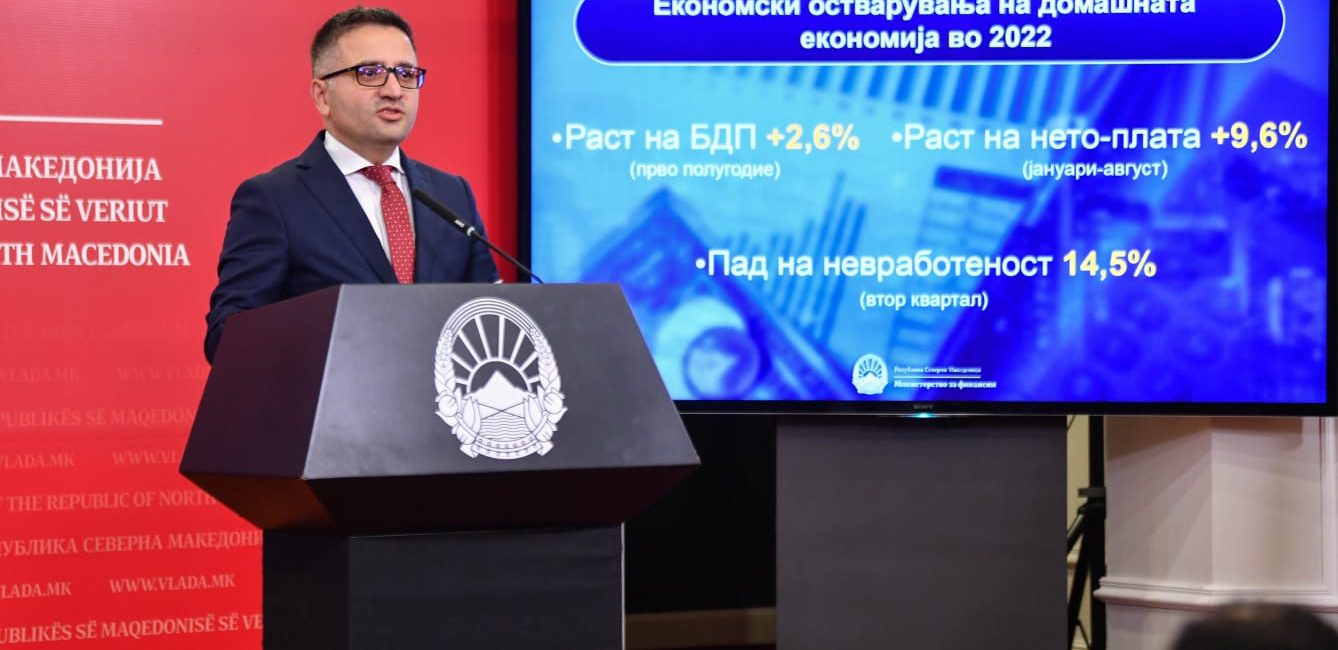2nd November 2022, Skopje – Government adopted the first medium-term Budget, as proposed by the Ministry of Finance, in line with the newly adopted reform Organic Budget Law. The 2023 Draft Budget is aimed at overcoming the challenges of the global economic and energy crisis, with budget funds amounting to EUR 250 million allocated therefor. Budget also lays the foundations for accelerated medium-term growth, under which funds have been allocated for increasing pensions, supporting companies and farmers, transfers to local government units, as well as EUR 795 million for capital investments or by 52.3% more compared to 2022. This Budget is guided by the golden rule in the field of economics, as per which capital investments are higher than the deficit.

As regards 2023 Draft Budget, the Government remains consistent with its commitment to gradual budget fiscal consolidation, with deficit projected at 4.6% of GDP, which is to be reduced to 3% in the medium term, even below the Maastricht Criteria.
“What is particularly significant is that the 2023 Budget is based upon the golden rule in the field of economics. Golden rule means to borrow only to finance investments, capital projects, projects that will add value to the economics, accelerate growth and contribute to improving the living standard of our citizens. This Budget will be guided by the value for money principle, while care will be taken to ensure that the citizens’ money will be geared towards generating greater benefits in attaining the goals for higher quality of life”, Minister of Finance, Fatmir Besimi underlined, while elaborating on the 2023 Draft Budget. Minister pointed out that this Budget is based upon strategic goals, i.e. fiscal consolidation, policy success measurability indicator system, scaled-up investments, fiscal decentralization promotion, continuous promotion of fiscal transparency and acceleration of the economic growth to 5% per year.
“Economic growth is projected at 2.9% in 2023. Inflation will start to decrease as of next year, however, amid still present high prices of energy products and food on the international markets, it is projected at 7.1%. However, the medium-term projections are opposite thereto. Global trends, as well as global supply chains are expected to stabilize, which will be accompanied by high economic activity growth at our major trading partners. Economic policies and measures contained in the Fiscal Sustainability and Economic Growth Plan, Public Investment Plan and Growth Acceleration Plan will be a solid basis for doubling the economic growth compared to the average in the last decade. In the period 2023-2027, average economic activity growth will reach 4.6%, whereby 5% growth rate is expected as of 2025”, Minister of Finance pointed out.
As regards medium-term projections, Besimi indicated the investments, which are expected to record average annual growth of around 8%. In the period 2024-2027, employment growth will be accelerated to 3.2% in average per year, thus contributing for the unemployment rate to be reduced to 9.4% in 2027. In this period, average net wage is expected to increase by 6.1% in nominal terms on annual basis. Inflation rate will be gradually stabilized, projected at 7.1% in 2023 and 2.5% in 2024, to be reduced to 2% in the medium run.
Revenues under the 2023 Draft are projected at Denar 282 billion, being higher by 14.8% compared to 2022, with the expenditures being projected at Denar 324.8 billion or by 12.6% higher compared to 2022, i.e. gradual fiscal consolidation continues to be carried out, with a budget deficit lower than the previous year’s one, accounting for 4.6% of the projected GDP.

Minister also stressed that budget funds projected in the amount of Denar 75 billion are aimed at paying pensions, or by around 10% more compared to 2022. This is coupled by the new pension calculation methodology, according to which, pension indexation is carried out as per the CPI trends, accounting for 50%, and the increase in the average wage paid to all employees, accounting for 50%, all to the end of providing decent living standard for the retirees.
As for transfers to local government units, it is planned to increase the percentage of VAT revenues distributed to municipalities from 4.5% to 5.5%, accompanied by the additional increase in the general grants to municipalities by Denar 1.2 billion, all to the end of strengthening the municipal fiscal capacity. Additional Denar 2 billion increase is intended for financing the increased wages by 15% in primary and secondary education at local level and 15% for educators and child carers in the kindergartens, as well as for financing the higher transport and electricity costs.
Budget, i.e. projected deficit and debt repayment amounting to Denar 52.1 billion, on the basis of prior debts falling due, almost half of which is the Eurobond issued in 2016, will be financed from domestic and foreign sources.
Domestic borrowing will be realized via government securities or domestic loan, while foreign borrowing will be carried out by issuing debt securities on the international capital market, tranche disbursement under the IMF Precautionary and Liquidity Line, as well as favourable funds from foreign financial institutions and credit lines intended for financing certain projects and budget deficit. Choice of a financing source will be based on the favorable ongoing developments on the international capital market. For the purpose of prudent public finance management, Ministry of Finance will consider the possibility for active debt portfolio management through liability management activities.
















